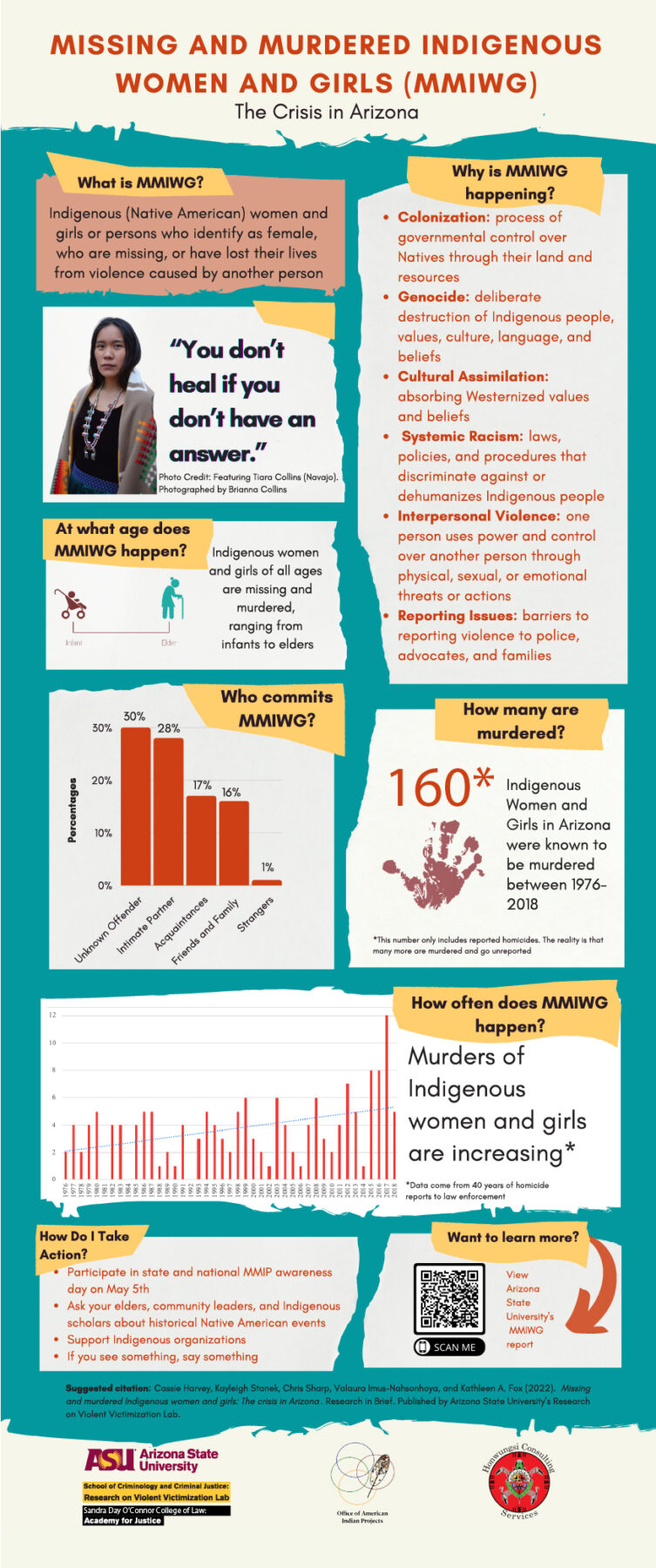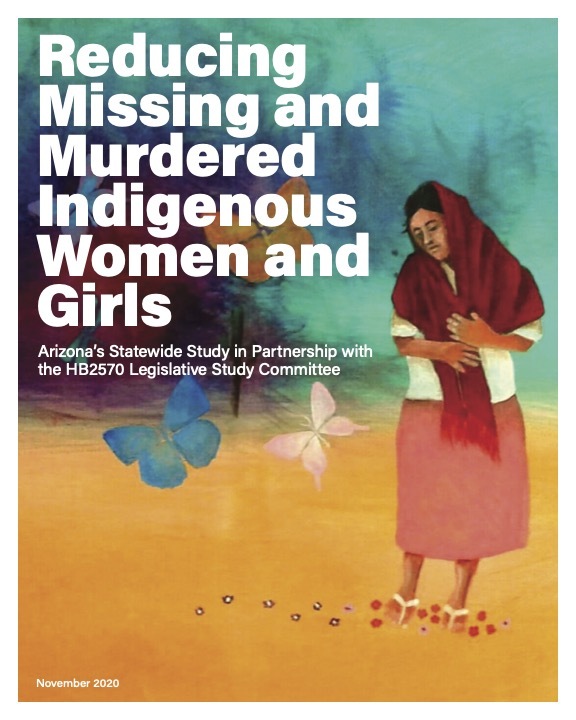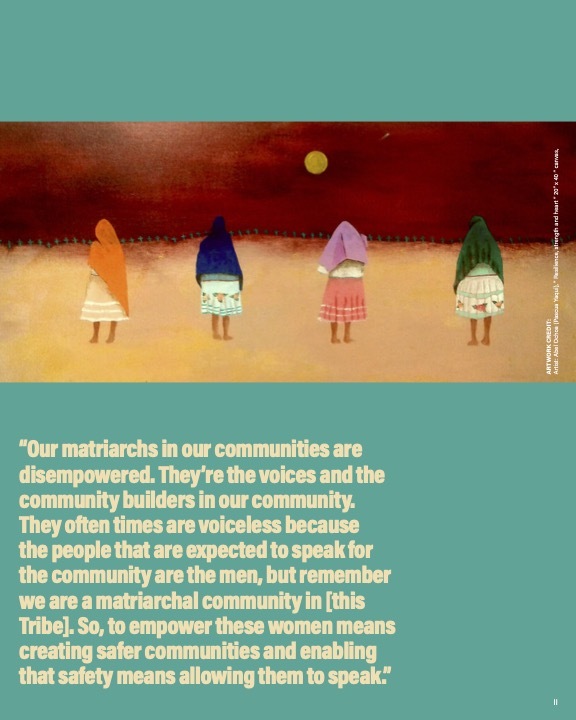
Reducing Missing and Murdered Indigenous Women and Girls
Arizona’s Statewide Study in Partnership with the HB2570 Legislative Study Committee – November 2020
The United States is now waking up to the fact that Indigenous Peoples have been oppressed by the dominant (non-Indigenous) culture for centuries. This oppression continues today and has led to a national and international crisis involving missing and murdered Indigenous Peoples (MMIP).
Forward by State Representative Jennifer Jermaine (White Earth Ojibwe), District 18
Missing and Murdered Indigenous Women and Girls (MMIWG) is a complex problem that spans many jurisdictions, but when you overlay the history of Indigenous Peoples and the matrilineal nature of Indigenous communities, the problem takes on a new meaning.
Often when an individual disappears and is found murdered, it affects the entire family and Clan structure for generations. The children often end up in the Indian Child Welfare and Child Protective Services Systems. Prior to the establishment of the Indian Child Welfare Act in 1978, children were separated from their Tribes and placed with non-Native families or in Native American Boarding School. This is what happened to my family.
Read more about Jennifer Jermain’s story in the MMIWG report below.
Executive Summary
The United States is now waking up to the fact that Indigenous Peoples have been oppressed by the dominant (non-Indigenous) culture for centuries. This oppression continues today and has led to a national and international crisis involving missing and murdered Indigenous Peoples (MMIP).
This report aims to tell a data-driven story about what is known so far about missing and murdered Indigenous women and girls (MMIWG) in Arizona and offers best practices to reduce MMIWG. The goal of this work is to improve the lives and safety of Indigenous Peoples and communities. We thank the State of Arizona for recognizing the importance of this issue and being at the forefront in terms of legislation. The focus on women and girls is a direct mandate from Arizona’s MMIWG legislation and an initial step toward understanding and reducing murder and disappearance of all Indigenous Peoples in the state including lesbian, gay, bisexual, transgender, and Two Spirit people.
Federally-recognized Tribal Nations are sovereign (self-governing) nations and part of the United States family of governments.14 A government-to-government relationship defines how Tribal Nations are defined in relationship with the U.S. However, few seem to understand this relationship. The Trust Responsibility15 is the promise to fulfill treaty obligations in perpetuity for giving up nearly all Tribal lands to the U.S. The Trust Responsibility ensures that Tribal Nations will always have seat at the table within the family of government within the U.S. The Trust Responsibility requires the federal government to act in the best interests of Tribal Nations to ensure healthy and thriving Tribal Nations. As this country grew via westward expansion and policies of Manifest Destiny16 (in and of itself a problematic term)

Tribal Nations were subjected to a multitude of laws and policies that deprived them of land, attempted to assimilate them, and continues –in many ways—to oppress them. The term for this is Colonization, and the impacts of it is often seen in the form of the erasure of Native individuals, cultures, and nations. This is a contributing factor to the national and international crisis involving the missing and murder of Indigenous Peoples.
It is paramount to remember that Indigenous Peoples and governments have inherent rights and a political relationship with the U.S. government. These rights do not derive from race or ethnicity. Tribal citizens are citizens of three sovereigns: their own Tribal Nations, the U.S., and the state in which they reside. This contributes to the issue of MMIP via jurisdictional issues which will be discussed later. Indigenous Peoples are members of sovereign Tribal Nations. The U.S. recognizes this unique political status in the Trust Responsibility.
The meaning of the word “Indigenous.” For purposes of this study, Indigenous Peoples refers to those of American Indian/Alaska Native decent. The federal government and state governments use the term American Indian/Alaska Native racial category as established by the U.S. Census Bureau. When referring to individuals, this study will use the term Indigenous, but for governments we will use “Tribal Government” and “Tribal Nation” interchangeably. When we discuss other studies, we use the term that the authors used (e.g., Native American, Alaska Native, Hawaiian Native, American Indian, Aboriginal, and Indigenous) in an effort to accurately describe populations.
The first responsibility of any government is the safety and protection of its people. Historically, nothing has been more important or vital to the State of Arizona. In 2020, Indian Country in Arizona is still experiencing a public safety and public health crisis created primarily by violent behavior against vulnerable Indigenous women and family members and growing incidents of unsolved cases of missing and murdered women and girls. Arizona Tribes are in the best position to close jurisdictional gaps and safe havens for lawbreakers. The starting place to reverse historical jurisdictional problems and injustices in Indian Country, is to strengthen Tribal justice systems and improve state and federal cooperation and coordination with tribal governments. From Tuba City to Sells, federal laws and state policies should not hinder or prevent Tribes from doing what their ancestors once did, protecting their way of life.
Read more of the Executive Summary in the MMIWG report above.
National Day of Awareness Videos
May 5 is National Day of Awareness for Missing and Murdered Indigenous Women and Girls which is meant to increase awareness of the disproportionate violence experienced by Indigenous women in the United States and Canada. Professor of Law and Deputy Director for the Academy for Justice, Valena Beety, discusses research and legislation being brought forth by Arizona House of Representatives, Jennifer Jermaine – District 18, ASU School of Criminology and Criminal Justice Professor, Kate Fox, Academy for Justice Social Worker and Policy Fellow, Sarah Julian, and Law Student and Academy for Justice Research Assistant Hilary Edwards.
Resulting Project Resources
Reducing Missing and Murdered Indigenous Women and Girls: Arizona’s Statewide Study in Partnership with the HB2570 Legislative Study Committee – November 2020
The United States is now waking up to the fact that Indigenous Peoples have been oppressed by the dominant (non-Indigenous) culture for centuries. This oppression continues today and has led to a national and international crisis involving missing and murdered Indigenous Peoples (MMIP).

